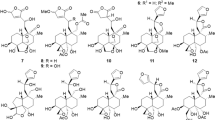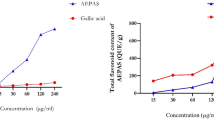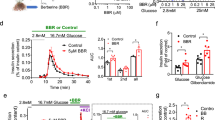Abstract
THE finding of Shaw-Dunn and co-workers1 that alloxan (and a styryl-quinoline) causes diabetes by damaging the pancreatic islet cells has since been amply confirmed in a number of laboratories, working with various animal species. Attempts to discover other substances with similar action have so far been unsuccessful, nor has any explanation been offered regarding the mechanism by which alloxan attacks the β-islet cells.
This is a preview of subscription content, access via your institution
Access options
Subscribe to this journal
Receive 51 print issues and online access
$199.00 per year
only $3.90 per issue
Buy this article
- Purchase on Springer Link
- Instant access to full article PDF
Prices may be subject to local taxes which are calculated during checkout
Similar content being viewed by others
References
Shaw-Dunn, J., Sheehan, H. L., and McLetchie, N. G. B., Lancet, 244, 484 (1943).
Jacobs, H. R., Proc. Soc. Exp. Biol. Med., 37, 407 (1937).
Goldner, M. G., and Gomori, G., Endocrinology, 35, 241 (1944).
Thorogood, C., Federation Proc., 3, 48 (1944).
Strecker, A., Ann. Chem., 123, 363 (1862).
Author information
Authors and Affiliations
Rights and permissions
About this article
Cite this article
BRÜCKMANN, G., WERTHEIMER, E. Diabetogenic Action of Alloxan Derivatives. Nature 155, 267–268 (1945). https://doi.org/10.1038/155267b0
Issue Date:
DOI: https://doi.org/10.1038/155267b0
This article is cited by
-
Factors affecting the inhibition by alloxan, and effect of streptozotocin on phosphate transport in isolated mouse mitochondria
Acta Diabetologica Latina (1982)
-
Beitrag zur qualitativen und quantitativen Histologie des Dialurs�urediabetes der Albinoratte
Zeitschrift f�r Zellforschung und Mikroskopische Anatomie (1953)
-
Pruritus in Diabetes Mellitus
Journal of Investigative Dermatology (1948)
-
�ber die Blutzuckersteigernde Wirkung des Isatins
Klinische Wochenschrift (1948)
-
Possible Synergistic Effect of Cod Liver Vitamin D on Synthetic Vitamin D3
Nature (1945)
Comments
By submitting a comment you agree to abide by our Terms and Community Guidelines. If you find something abusive or that does not comply with our terms or guidelines please flag it as inappropriate.



